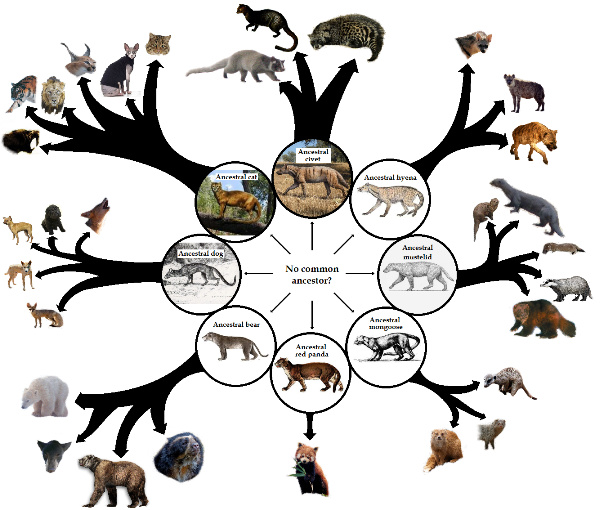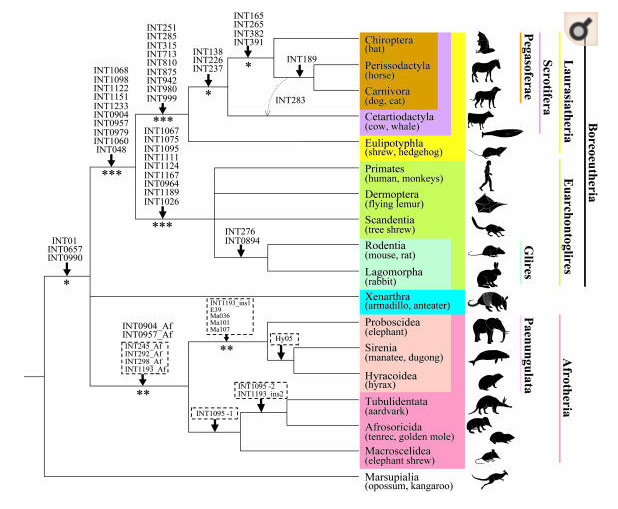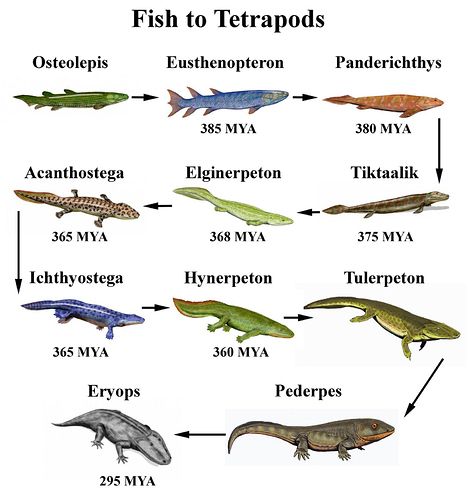Birds evolved from saurischian dinosaurs.
Many thanks George. This is indeed an ideal area of research, even more as I happen to live in the land of the Tassie Devil and the Thylacine!
I think the contention is around how and to what degree a species can diverge/evolve/adapt over time. This article outlines the debate:
“All we have ever observed is what evolutionists themselves call “subspeciation” (variation within kind), never “transspeciation” (change from one kind to others) (Figure 22).”
So, im still stuck at the view that basic ‘kinds’ of life had individual (seperate) beginnings, and that transpeciation is not proven or probable.
Therefore, I dont accept the common view that our current feathered birds are a transpeciation of dinosaus.
Im not sure from your posts which way you lean on this, but keen to here your views.
Cheers, Nic
Yes… this is true.
And according to this article, Archaeopteryx was also a flying reptile, yes?
The basic question is what mechanism stops the accumulation of small changes before they result in a large change.
The common view is that birds ARE dinosaurs. You’re using the term speciation in a way that renders it meaningless.
I think that you have a very large problem without realizing it. This diagram helps illustrate this:
The problem is just that while the idea might sound nice, that there is some boundary past beyond which further transitions cannot occur, there is no line that anyone can communicate. There is no agreement amongst those who reject common descent what is related to what and what doesn’t share common descent. There is no, ‘variation within a ‘kind’ shall stop here and no further.’ The problem being that the second anyone starts to go and identify what belongs to a ‘kind,’ the original ancestor of kinds start to become ridiculously similar, more similar than the species within each kind as this article highlights:
I’m really interested in your background–feel free to elaborate here or on a new thread sometime, if you like. We had a great neighbor (a nurse anesthetist) in the mission station I grew up on in Niger, from Tasmania–she’d talk about it almost as lovingly as our New Zealand missionary did about her home country. Grew up there? What made you interested in science? What’s your faith background? No hurries, but it’s fun to have introductions because it helps us know what makes us tick.
Leibniz’s point of view is irrelevant to my position - I don’t argue that God needs to “wind up … clean … mend” His creation.
Placing bats in a “sister group” to horses, rhinos and tapirs just goes to show how absurdly wrong evolutionary interpretations of scienfific data can be.
Think of it this way: Human beings can use genetic engineering to modify existing creatures, but it’s utterly impossible for humans to create an organism from nothing. Clearly then, it is an infinitely greater feat for God to create an organism from nothing than to modify a pre-existing organism. This is a point was made the great Catholic philosopher, Thomas Aquinas, eight centuries ago.
Furthermore, the separate creation of creatures or even nested hierarchies of creatures(according to my progressive creation model) accords with the Genesis description of organisms created “according to their kind” - if evolution be true, this term is rendered senseless, as one kind evolves into a different kind.
Whether made as a separate creation or as a result of evolution, the “end products” are equally impressive, I guess.
Let’s see…
On the one hand, we have an argument based on painstakingly examined genetic data, with relevant sequences clearly laid out and labeled for other researchers to falsify.
On the other hand, we have an argument based on Edgar’s personal incredulity.
Hmm… This is a tough one to judge. ![]()
P.S. Fwiw, it’s a sister group not to horses/rhinos/tapirs, but rather to horses/rhinos/tapirs/carnivores. The entire group, including bats, has been given the name Pegasoferae.
l agree that medicine and treatments are based on the validity of evolutionary assumptions - such as mutations and natural selection - ie, microevolution. However, my claim is that no medicine or treatment (or any form of applied science) depends on the “information” that life on earth evolved from microbes … or that humans evolved from a hominid or that humans and chimps share a common ancestor or Darwin’s “tree of life”.
No one is going to die and no drug or vaccine is going to fail because a biologist doesn’t believe in Darwin’s “tree of life” or that humans and chimps share a common ancestry.
Speciation is a demonstrable fact - why would I “begrudingly admit” it happens? Green Warblers speciate into more Green Warblers, for example - but so what? Bacteria speciate into more bacteria - but so what?
I wouldn’t reject that at all - that’s microevolution made possible by genetic variations within a species and natural selection.
If humans were responsible for it, it hardly qualifies as evidence of a natural process. Furthermore, the offspring of this algae-carrying protist are probably exactly the same of the original (algae-less) protist - ie, no evolution.
My bet is, the “Vit-C gene” isn’t broken at all - genetic science simply doesn’t understand it properly yet and has misinterpreted the evidence. In fifty years time, scientists will probably say, “Oh yeah, the broken Vit-C thing … well, they got that wrong, didn’ they?” The workings of living organisms provides never-ending mysteries and the potential for never-ending mistakes by scientists.
I don’t support a global flood. I believe Noah’s Flood wiped out all of humanity but was regional.
Science is not infallible. I believe any conclusion of human evolution from the evidence of genetic science, for example, is wrong because Genesis 2:7 says God created the first human from inanimatel matter.
Three scientists sped up MICROevolution in a lab. Good for them, but what’s this got to do with Darwin’s “tree of life” or humans evolving from a hominid?
But you do, in a way.
You say He created one form of life, then he let it evolve in tiny ways (microevolution), then He jumped in and created (from scratch) another form of life that looked almost exactly like the last micro-evolved one but which had some element that you personally couldn’t imagine evolution producing.
Then he allowed it to micro-evolve again, but when some new element came up that He just couldn’t manage to convince micro-evolution to create, He generated another new version… from the dirt. I mean, yes, it looked almost exactly like the last one, but had some leap in its development that Edgar couldn’t imagine happening by evolution.
Sounds a lot like Leibniz’s critique to me…
You’re splitting hairs. Darwin’s “tree of life” is 150 years old and belief in life evolving from simple beginnings has been around for at least 2500 years.
Sure, that question seems to fit the bill. If you’re going to argue that the common ancestry of human and chimps has proven useful in treating Ebola, please do - I’ve come across spurious arguments like this before. Explain your reasoning … then I will point out where your reasoning breaks down.
Please explain what “mathematically-derived nested hierarchies that are superimposable” means.
My progressive creation model accomodates the creation of individual creatures … as well as the creation of entire nested hierarchies.
That comes as no surprise - how can science ever explain how Original Sin affected the DNA of creatures? But I like my hypothesis and I think I’ll stick with it
If evolution be true, unfortunately you and I won’t live long enought to see the gaps filled.
Btw, I have no theological objection to the biological evolution of non-human creatures, but at this point in time I don’t think that’s the true history of life on earth.
No, I would not.
I can’t remember.
God could have created separate and distinct nested hierarchies (ie, non-contiguous). The fossil evidence of such a creative process could be (reasonably) misinterpreted as a contiguous process of biological evolution - albeit with lots of gaps.
I wouldn’t predict how God would create life.
What makes you qualified to predict how God would create life?
Gaps are everywhere - even in cases where evidence of “transitionals” is the strongest.


